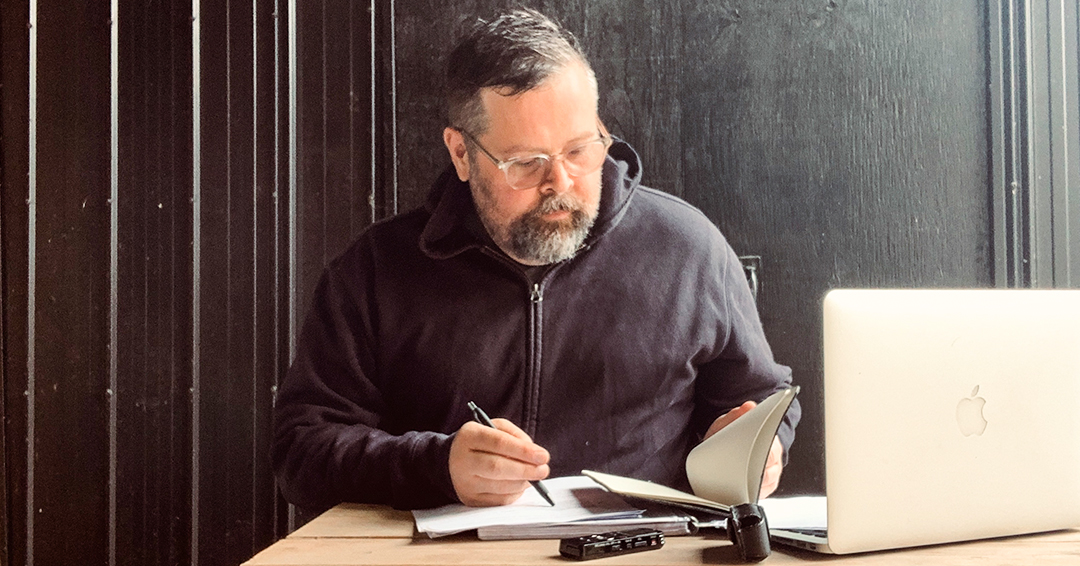
“Everyone dies, just some more than others.”
And with that perhaps subconscious Orwellian reference (“All animals are equal but some are more equal than others,” in Animal Farm), Todd Meyers, PhD, Marjorie Bronfman Chair in Social Studies of Medicine at McGill University’s Faculty of Medicine and Health Sciences, concludes his essay on how grief ripples through social groups after a drug overdose, published recently in The Lancet.
“I was told the phrase by someone working in harm reduction and thought this is a perfect encapsulation of the problem, which is that not all deaths are regarded as the same. And that is a politically uncomfortable reality,” Prof. Meyers says. “It might be Orwellian, maybe it is.”
Prof. Meyers was trained in anthropology and public health science at Johns Hopkins University and studied studio arts at The School of the Art Institute of Chicago. One of his first projects concerned opioid dependence among adolescents in Baltimore, Maryland, which he proceeded to develop into a book titled The Clinic and Elsewhere. “That project was a study where I followed kids who were in residential treatment for not just opioid abuse, but also polysubstance abuse, and who were in treatment with a relatively new pharmaceutical treatment for opioid dependence called buprenorphine,” explains Prof. Meyers. “What I found was that what worked in the clinic only gave me a partial picture of what their lives and relationship to, not just addiction, but also treatment was. I followed kids back into their homes or onto friends’ couches, or through the juvenile justice system, or back into treatment. And I was really trying to understand the relationship between this thing we call addiction and life. That study, and that kind of continued preoccupation has led me to ask more questions.”
Those questions turned his attention away from bold headlines about ‘addicts and addiction’ to focus on how relatives, friends, clinicians, social workers and advocates feel loss. “I wanted to understand just how loss was felt across this geography of people, because those people are also in the same world, they are encountering the same people,” he says.
His essay in The Lancet, titled ‘Grief, But Different,’ serves as a foray into the circuitous labyrinthine of grieving those who lost their lives to overdose, pointing out how societal stereotypes often produce nebulous distinctions among various ‘classes’ of death.
“People who use substances are pushed to the social margin, and when people die from overdose it is very easy to moralize and to think that in the time of mass death (e.g. during the COVID-19 pandemic) that others are more deserving of remembrance and care,” he shares. “I’m suggesting that we should push against that narrative. Real work is being done by people who are pushing against that narrative day-to-day, including people who are in positions to help others who are using substances, people who work in harm reduction, people who work in recovery, et cetera. That is one thing that I hope that this empirical research, my ethnography, will help to do, to push back on that undeserving narrative, not just rhetorically, but through a demonstration or a description of the kinds of work and labour people are engaged in.”
Pushing back against an institutionalized narrative will help legitimize grief, regardless of the nature of its origin. “We ask a lot of people who are grieving an overdose death. On one hand, there’s the grief itself, and on the other hand, there’s also this unfair burden that those individuals have to take on to make that grief legitimate. And whatever our sentiments might be, everyone should be grieved equally. But that’s just not how inequalities work. There’s something very special about the grief undertaken by those who have lost loved ones to overdose,” Prof. Meyers points out.
At the heart of the overdose crisis is the failure of systems of protection and care, Prof. Meyers concludes. “There’s great variability in people’s experiences. Addiction and overdose death is not one thing happening with one group of people and one set of circumstances. There are these massive failures in infrastructure as well as social and political failures, and that’s where the inequality abounds, even though there’s so much variability around substance use and there’s so much diversity amongst people who have overdosed, socioeconomic diversity, race, ethnicity, et cetera. At the same time, there are these things that just are so large that they can hold all of this diversity and dish out inequality equally, which is really quite horrible.”
Inevitably, the discussion of social supports circles back to funding. During Mental Health Week in Canada, May 1-7, its sponsor, the Canadian Mental Health Association (CMHA) released findings stating that 87% of Canadians want universal mental healthcare. Coincidentally, the federal government announced it will increase healthcare funding by $198 billion over the next 10 years. What remains unclear is how much of that funding will address mental health issues. While Prof. Meyers is sceptical, he maintains a positive outlook. “I mean, it’s hard for me to say, but increasing funding in this domain surely can’t hurt things.”
